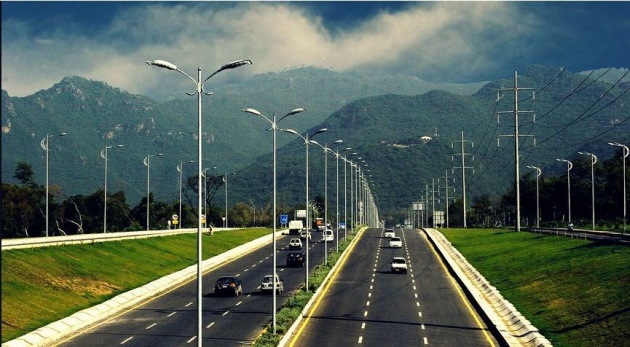Islamabad (/ɪzˈlɑːməˌbɑːd/; Urdu: اسلام آباد, Islāmābād, Urdu pronunciation: [ɪsˌlɑːmɑˈbɑːd̪]) is the capital city ofPakistan located within the Islamabad Capital Territory. It has a population of 2 million[4] and together with its neighboring twin city of Rawalpindi, the greater Islamabad-Rawalpindi metropolitan area is the third largest in Pakistan with a population of over 4.5 million inhabitants.[5]
Since its foundation, Islamabad has attracted people from all over Pakistan, making it one of the most cosmopolitan and urbanized cities of Pakistan. As the national capital, Islamabad is the seat of the Government of Pakistan; the Presidential Palace (Aiwan-e-Sadr) is located here. Islamabad is also home to the Pakistan Monument, which is one of the two national monuments of Pakistan. Islamabad hosts a large number of foreign diplomats, politicians and government employees. The Capital Development Authority is responsible for managing the public works within the city.
Islamabad is located in the Pothohar Plateau in the northeastern part of the country, within the Islamabad Capital Territory. The region has historically been a part of the crossroads of Punjab and Khyber Pakhtunkhwa with theMargalla Pass acting as the gateway between the two regions.[6] The city was built during the 1960s to replaceKarachi as Pakistan's capital. Islamabad is a well-organised international city divided into several different sectors and zones. It is regarded as the most developed city in Pakistan and is ranked as a Gamma+ world city.[7]
The city is home to the Faisal Mosque, the largest mosque in South Asia[8] and the fourth largest mosque in the world.[9][10] Islamabad has one of the highest literacy rates in Pakistan.[11] There are 16 recognized universities in Islamabad, including Quaid-i-Azam University and the National University of Sciences and Technology.[12] Allama Iqbal Open University in Islamabad is one of the world's largest universities by enrollment. Islamabad has the lowest infant mortality rate in the country at 38 deaths per thousand as compared to the national average of 78 deaths per thousand. The Pakistan Institute of Medical Sciences is one of the largest research oriented hospitals in South Asia.



